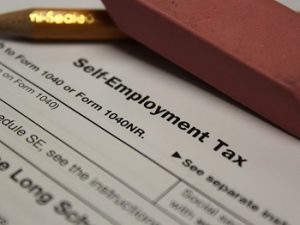
As the U.S. economic landscape continues to change, Americans have been finding new ways to earn money. Perhaps more often than ever, we’re seeing many people walking away from the once-coveted 9 to 5 job and instead moving into the self-employment arena. As is to be expected with any life-changing decision, making the shift to self-employment comes with an array of tax benefits and pitfalls to consider.
WHAT QUALIFIES AS SELF-EMPLOYMENT?
Let’s begin by defining what it means to be self-employed. Per the Internal Revenue Service, generally you are considered self-employed if:
- You carry on a trade or business as a sole proprietor or an independent contractor;
- You are a member of a partnership that carries on a trade or business; And/or,
- You are otherwise in business for yourself (which also includes a part-time business).
As you can see, the IRS’s definition of what it means to be self-employed is rather broad. In general terms, self-employed individuals are those who earn their income by conducting profitable operations from a trade or business directly operated by that individual.
SETTING UP YOUR BUSINESS
There are a number of options available for setting up your business as a self-employed individual for tax purposes. The most cost-effective option is to become a sole proprietor. As a sole proprietor, you can either work under your own name, or create a fictitious name, and report your earnings at year-end directly on your tax return by filing a Schedule C. Although a sole proprietorship is perhaps the most affordable (and quickest) way to set up your business, it’s not necessarily the safest, as it leaves you personally liable for the debts and obligations of the business. In other words, under a sole proprietorship, there is no separation between you, the individual, and your business.
Lately, there has been an increase in self-employed individuals choosing to operate under a single member Limited Liability Company (LLC). LLC’s, which provide the individual with an option to operate under a business name, require that the individual obtains an Employer Identification Number (EIN) to register the business. Generally speaking, LLC’s provide with the business owner with protection against creditors and debtors targeting his or her personal holdings–although there are some exceptions. Single-member LLC’s, like sole proprietorship earnings, are also reported directly on Schedule C of your tax return.
INCOME & EXPENSE TRACKING
Once you have your business set up, it’s time to consider how you will keep track of your income and expenses. The first step is to open a business account, which is a bank account that is kept separate from your personal account. This is the account into which you will be depositing your self-employed earnings and from which you will pay your business expenses. While it might seem self-explanatory, it is extremely important to ensure that this is done correctly. The bank statements from your business account will be used to create your accounting books and records, which in turn will provide the necessary information for your tax filings at year-end.
EXPENSES
What is considered a business expense? Business expenses are any costs associated with operating your business. To be deductible, a business expenses must be considered both “ordinary and necessary.” An ordinary expense is defined as one that is common and accepted in your field of business. A necessary expense is one that is helpful and appropriate for your business. For example, let’s say you are starting a consulting business. In order to conduct business effectively, you will most likely need to rent an office, obtain a business phone, and advertise, among other things. All of these expenses are considered business expenses, and are fully deductible as such. There is, however, one exception and it applies to startup expenses. Startup expenses are generally expenses related to the creation or acquisition of a trade or business. If your startup expenses are in excess of $5,000, then they are not deductible in the year incurred rather are deductible over a 15-year period.
LOSSES
Of course, not everyone who makes the decision to be self-employed is profitable right away. In fact, it can sometimes take years to turn a healthy profit. For the periods that your business operates at a loss, the IRS will allow you to take a deduction for those losses on your tax return. If the losses continue year after year, the IRS might choose to challenge the classification of your expenses and reclassify them as a “hobby loss,” Or a “non-deductible loss incurred as a result of doing an activity for personal pleasure instead of for profit.” In order to make a distinction between a hobby or business activity, the IRS will take into account all facts and circumstances with respect to the activity. As is true of all tax scenarios, not all circumstances are the same, and we recommend reviewing all relevant facts and background information with your tax advisors prior to any decision-making.
Our experienced staff of professionals at FF&F are familiar with the process of starting a business, as well as how to go about tracking your business expenses as a self-employed individual, and we are available to assist you through each step. In addition, we have an expert Accounting Services team that can provide you with a full range of bookkeeping services as needed for your business. For guidance with self-employment considerations or information about our services, please contact us at info@fffcpas.com or 212-245-5900.
 Jonathan Niyazov, CPA is a Tax Manager with FF&F. He has over 9 years of combined tax and accounting experience compromised in both, closely held private companies, and large international accounting firms. Jonathan has a strong background in individual, corporate, and partnership taxation. His experience in the private and public sectors grants him a unique understanding of taxation that provides our clients with tax savings strategies at every level.
Jonathan Niyazov, CPA is a Tax Manager with FF&F. He has over 9 years of combined tax and accounting experience compromised in both, closely held private companies, and large international accounting firms. Jonathan has a strong background in individual, corporate, and partnership taxation. His experience in the private and public sectors grants him a unique understanding of taxation that provides our clients with tax savings strategies at every level.
